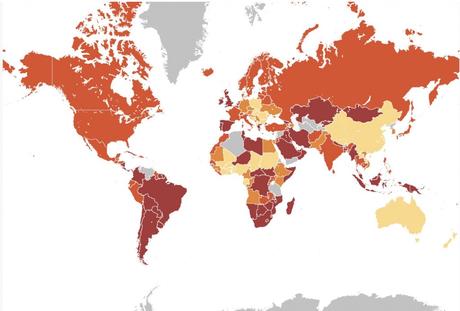As the Delta variant of the COVID-19 virus continues to spread around the globe it is becoming increasingly unlikely that we'll return to some semblance of normalcy in the near future. A few months back, bolstered by the arrival of several vaccines, it seemed like we were nearing the light at the end of the tunnel. But as the number of coronavirus cases begins to spike once again, we're reminded that we still have a long way to go in our fight against the virus.
This was hammered home last week thanks to an updated to the Center for Disease Control's international travel guidelines. In its latest evaluation of the impact of COVID-19 on our planet, 16 new countries were added to CDC travel list under the Level 4 category. That brings the total of number of destinations that are currently deemed "very risky" to 70.

Delta on the Rise
The so-called Delta varian of the coronavirus traces its origins back to India, which has been particularly hard hit by the virus. This mutant strain of COVID is believed to be more virulent, meaning its symptoms are more severe than the original version that first appeared in China in late 2019. It also happens to be more transmittable, spreading faster and to a larger portion of the population. This includes younger and healthier people, which had previously been deemed at low risk.
Thanks to Delta, cases of COVID have begun to spike in a number of areas around the globe, including the U.S., the U.K., Western Europe, and parts of Asia. This comes as a number of nations have eased restrictions on their population and have reopened their borders to outside visitors. As you would expect, this has resulted in some dire warnings from the CDC for anyone considering international travel, particularly to those places it has deemed as high risk.
As we noted several months back, travel of any kind remains a risky proposition. Many countries continue to enforce quarantines for foreign visitors and have banned anyone who isn't vaccinated from entering. Considering that much of the world's population has yet to receive the vaccine, it could be sometime before taking an international trip becomes truly safe again. Meanwhile, more variants like Delta could take hold, including a worrisome version in South America that has already been labeled as Lambda.

16 New Very Risk Destinations
When the CDC travel list was updated last week to account for the spread of Delta, there were some very popular destinations that found themselves added to the Level 4 category. According to experts, travelers should avoid visiting any of the countries who have earned this dubious designation and those that do go should be fully vaccinated first. Even then, quarantines and COVID testing are highly recommended.
The 16 countries that ere added to the "very risky" tier include: Andorra, Curaçao, Gibraltar, Greece, Guadeloupe, Iran, Ireland, the Isle of Man, Kazakhstan, Lesotho, Libya, Malta, Martinique, Saint Barthelemy, Saint Martin, and the US Virgin Islands.
This brings the total number of countries on the CDC's Level 4 COVID risk tier to 70, many of which are also incredibly popular with travelers. The list, which can be reviewed in its entirety here, also includes Argentina, Brazil, Chile, Costa Rica, Maldives, Nepal, Portugal, Seychelles, South Africa, Spain, and the United Kingdom.
Plan Ahead, Be Safe, and Get Vaccinated
The grim news of the spread of the Delta variant and the regression of countries in controlling the disease is particularly disheartening to travelers. Many of us had hoped that if COVID cases continued to fall off that perhaps we could resume our adventures late this year or early next. That now seems increasingly unlikely as virus continues to disrupt life on a global scale.
If you are planning on traveling internationally in the near future, it is a good idea to plan ahead and check the requirements of the countries that you'll be visiting. If they require a negative COVID test and a quarantine upon arrival, be prepared to extend your stay bit longer. It is also important to continue to wear a mask in indoor environments and even socially distance yourself from others when possible. Most importantly of all, be sure to get vaccinated. It will greatly reduce the chances of contracting the virus and if you do, the symptoms will be much less severe.
Check the CDC's current recommendations and status level of countries around the globe on the organization's COVID-19 Travel Recommendations by Destination webpage.



